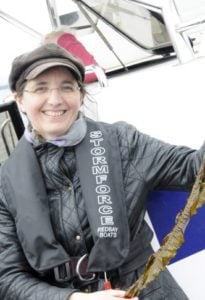Dr. Claire Gachon to discuss disease prevention strategies in cultivated seaweed
Abstract: Novel strategies for preventing diseases in cultivated seaweeds
Authors: Gachon Claire (presenting), Strittmatter Martina, Badis Yacine, Murúa-Andrade Pedro Calmes Benoît, Bertrand Jacquemin, Valero Myriam, Vallet Marine, Prado Soizic, Elizabeth J. Cottier-Cook.In any agricultural or aquaculture system, pests and pathogens typically reduce production yields by a fifth to a third; this also holds true for cultivated seaweeds. As seaweed cultivation develops and intensifies worldwide, the frequency and severity of disease outbreaks is increasing, for example on Gracilaria, Pyropia, eucheumatoids and kelps. Here, I will brush over different strategies developed in my group to describe and characterise hitherto unreported diseases of seaweeds and control pathogens in a cultivation context.
As a crucial prerequisite for the implementation of meaningful breeding strategies in brown algae, I will introduce our work on the mechanisms and heritability of disease resistance in Ectocarpus; we find that disease resistance is a phenotypically stable, quantitative, and heritable trait. Its fundamental mechanism is not only conserved against several pathogens but also across the entire brown algal lineage, thus providing proof-of-concept to breed for disease resistance in commercially important species.
To address the need for fast cost-effective tools fit for the quantitative phenotyping of numerous individuals, nephelometry will be described as a novel, non-invasive method for medium-throughput biomass measurement of macroalgae; application examples will be presented not only for disease diagnostic, but also for fertility and in vivo growth measurement.
I will also briefly introduce our work on commensal or beneficial microbes naturally associated to seaweeds that may counteract pathogens and be used as biocontrol agents and the outcome of a collaborative initiative undertaken in the framework of GlobalSeaweed, leading to recommendations for policy-makers.
About the presenting author:
| Claire Gachon is an algal pathologist, who investigates the ecology, physiology and genomics of algal diseases caused by protists. Initially focussed on the interaction between the intracellular pathogen Eurychasma dicksonii and the brown algal genome model Ectocarpus siliculosus, her research now encompasses a broad range of models, with an increasingly pronounced focus on applied topics; notably, this encompasses macroalgal breeding and disease management in the algal industry. Claire is fluent in biochemistry, molecular biology, genomics and bioinformatics. She has been participating to several seaweed genome projects, including Ectocarpus, Chondrus and Porphyra. Claire leads the NERC-funded GlobalSeaweed initiative and the Marie Curie ITN ALFF (the ALgal microbiome – Friends and Foes). She engages in community or community-building initiatives such as EMBRC and Unieuk and sits on various committees, such as the Council of the British Phycological Society and the New Phytologist Board of Advisors. |  |
About the Scottish Association for Marine Science (SAMS)
| The Scottish Association for Marine Science (SAMS) is one of the UK’s premier oceanographic institutions, committed to increasing our knowledge and stewardship of the marine environment through research, education and knowledge transfer. SAMS operates from a modern multidisciplinary marine science campus on the West Coast of Scotland, with state-of-the-art laboratory facilities. SAMS has been involved in macro-algal cultivation since 2004, operates two pilot seaweed farms and participates to several research projects on seaweed production and processing. |  |
